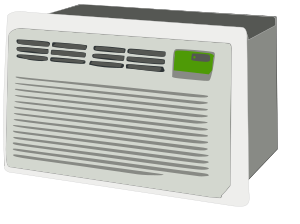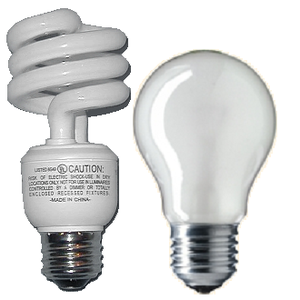Here are some ways to conserve energy in your home:
 Image via WikipediaHeating and Air Conditioning
Image via WikipediaHeating and Air Conditioning 1. If you’re going to be out of an air conditioned room for a long time, be sure to turn off the A/C unit - similarly if leaving on vacation, set your A/C to a lower setting, or even turn it off altogether if there aren't plants or pets or other things inside that may suffer due to heat while you're gone.
2. Rooms that are not used often should have sealed (or at least closed) vents.
3. You can also install ceiling fans that are remote controlled than have a built-in heater.
4. When the room is occupied, put the thermostat at a comfortable setting.
5. When the fireplace isn’t used, close the damper in the fireplace
Laundry Appliances:
1. Avoid using your washing machine in partial loads. It is better if you meet the capacity of the machine.
2. Very dirty clothes may be pre-soaked before washing. This will prevent you from running your machine twice.
3. For the garments that aren’t very dirty, use a smaller quantity of detergent and put your machine to a lighter wash setting.
4. Electric driers consume the most energy in your laundry tasks, so if you do have a clothesline, use it! The sunlight can also help kill bacteria, and your clothes will smell fresh too.
5. Ironing clothes should be done all at one time and during off-peak hours.
Refrigerators and Freezers:
1. Refrigerators and freezers should be defrosted regularly. Frost build-up can increase the load of the compressor motor. (Many newer Energy Star appliances have a self-defrosting feature, so you won't have to worry about this. But do keep the vents unblocked to allow proper air circulation to keep your food cold.)
2. Inspect your refrigerator door and keep an eye out for a leaking gasket. If you can feel cold air leaking around the seal, it's definitely time for a new fridge.
3. Avoid constant opening and closing of the refrigerator’s door because it can contribute to ice or frost build-up, and also causes the appliance to run more. When taking a number of things from the fridge, take them all out at once.
Kitchen Appliances:
1. Don’t boil water in an open pan. A pan that’s covered will boil the water faster, and also keep more water in the pan for your use.
2. Keep stove burners, range top and reflectors clean. It can help generate more heat and consume less energy.
3. When the food you’re cooking starts to boil, turn the electric stove to low mode.
4. Put smaller pans or pots on small burners or heating elements. If the burner is larger than the bottom of the pan, you are wasting a lot of energy, and the heating won't be as efficient. Always match burner and pan size whenever possible.
 Image via WikipediaLighting:
Image via WikipediaLighting:1. Switch off unused lights as well as other appliances that use electricity when not in use.
2. Utilize low wattage yet efficient lamps.
3. Replace your incandescent bulbs with fluorescent. These are available everywhere nowadays, at much lower prices than they used to be, and they can last 10 times longer (or even more) than traditional incandescent bulbs.
Those are just handful of tips to lower your energy bills. There are many other factors which can also guide you in conserving your home energy. Check back Friday for some tips on choosing efficient appliances, and assessing your home energy usage.

No comments:
Post a Comment